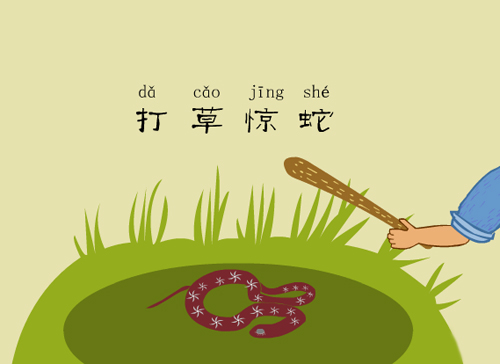
Stir the grass and startle the snake
Long long ago, a county magistrate named Wang Lu worked in present Anhui Province , east China . Wang Lu was very greedy and took many bribes. One of his secretaries was equally corrupt, and often schemed for Wang Lu's deeds.
One day a man went to the magistrate to lodge a complaint against the secretary. The secretary's crimes were almost the same as the crimes the magistrate himself committed. Wang Lu was so frightened that he forgot his proper role in handling the case. Instead of issuing a judgment, he couldn't help writing these words concerning the complaint: "By stirring the grass, you have startled me who am like a snake under the grass!"
The above story provided the idiom "Stir the grass and startle the snake". The original meaning is that punishment for someone can serve as a warning to others. But people now use the idiom to indicate that premature actions which put the enemy on guard.
打草驚蛇 (dǎ cǎo jīng shé)
從前,有個叫王魯的人在中國東部的安徽作縣令.王魯非常貪財,接受了很多賄賂.他手下有一位掌管文書事務的官員,也同樣貪贓,經常為王魯的行為出謀劃策.
一天,有人到王魯這兒控告這位官員.這位官員的罪行跟王魯的所作所為幾乎完全相同.王魯聽了嚇得都不知道如何來處理這件案子.他沒有作出判決,而是不由自主的在狀子上寫道:"你雖然打的是草,但我這就像伏在草下面的蛇,也受到驚嚇了!"
"打草驚蛇" 這個成語就是由上面這個故事產生的.原先的意思是指對某人的懲罰成了對其他人的警告,但現在人們用它來比喻不成熟的行為會使敵人產生戒備.

Copyright ©1999-2011 Chinanews.com. All rights reserved.
Reproduction in whole or in part without permission is prohibited.